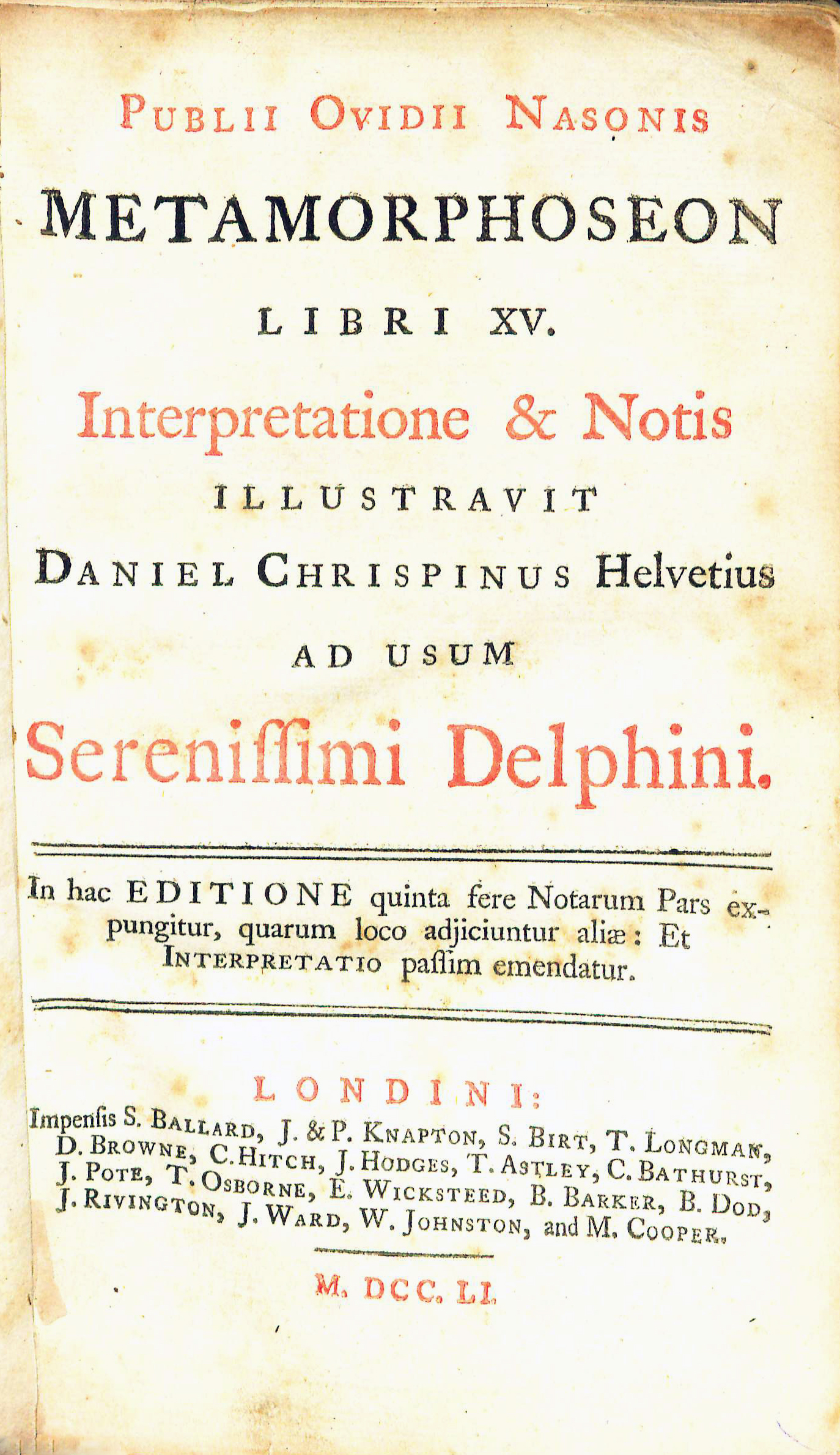Difference between revisions of "Publii Ovidii Nasonis Metamorphoseon Libri XV"
| Line 2: | Line 2: | ||
===by Ovid=== | ===by Ovid=== | ||
__NOTOC__ | __NOTOC__ | ||
| + | Modern readers are fortunate that the Roman elegiac poet Ovid (Publius Ovidius Naso) wrote of his own life in one of his poems, Tristia.<ref>[http://www.oxfordreference.com/view/10.1093/acref/9780199548545.001.0001/acref-9780199548545-e-2187 "Ovid”] in ''The Oxford Companion to Classical Literature'', ed. by M.C. Howatson (Oxford: Oxford University Press, 2011).</ref> He received a Roman education due to his family’s high social and political status as equestrians.<ref>[http://www.oxfordreference.com/view/10.1093/acref/9780192801463.001.0001/acref-9780192801463-e-1578 "Ovid "] in ''Oxford Dictionary of the Classical World'', ed. by John Roberts (Oxford: Oxford University Press, 2007).</ref> As the culmination of his studies, Ovid went on the typical aristocratic “Grand Tour” of Greece.<ref>Ibid.</ref> Political life was not for him, so after he held minor posts in Rome, Ovid dedicated his life to poetry and became part of Messallian group of poets.<ref>[http://www.oxfordreference.com/view/10.1093/acref/9780199548545.001.0001/acref-9780199548545-e-2187 "Ovid”]</ref> By 8 CE, Ovid “was the leading poet of Rome” but was suddenly banished by the Emperor Augustus to the city Tomis.<ref>[http://www.oxfordreference.com/view/10.1093/acref/9780192801463.001.0001/acref-9780192801463-e-1578 "Ovid"]</ref> His exile (due to a poem and an error which offended the emperor) in this Greek-founded city lasted for ten years, during which he kept his Roman property and civic rights, but his books were all removed from public libraries in Rome.<ref>[http://www.oxfordreference.com/view/10.1093/acref/9780199548545.001.0001/acref-9780199548545-e-2187 "Ovid”]</ref><br/> | ||
| + | <br/>This particular work is Books 1- 15 of Ovid’s ''Metamorphoses'' in the original Latin. It is a fifth edition with the earlier editions’ notes removed. This poem is contained in fifteen books of hexameter which were completed immediately before his exile.<ref>[http://www.oxfordreference.com/view/10.1093/acref/9780192801463.001.0001/acref-9780192801463-e-1578 "Ovid "]</ref> The poem contains a wide variety of memorable myths and legends, each telling of some type of supernatural transformation, “call[ing] attention to the boundaries between divine and human, animal and inanimate, raising fundamental questions about definition and hierarchy in the universe.” Ovid’s mastery of elegiac poetry was unsurpassed in his own time due to his variety and creative invention. “No Roman poet can equal Ovid’s impact upon western art and culture. Esp[ecially] remarkable in its appropriations has been the Metamorphoses.”<ref>Ibid.</ref> | ||
| + | |||
{{BookPageInfoBox | {{BookPageInfoBox | ||
|imagename=OvidPubliiOvidiiNasonisMetamorphoseon1751.jpg | |imagename=OvidPubliiOvidiiNasonisMetamorphoseon1751.jpg | ||
Revision as of 15:29, 6 February 2014
by Ovid
Modern readers are fortunate that the Roman elegiac poet Ovid (Publius Ovidius Naso) wrote of his own life in one of his poems, Tristia.[1] He received a Roman education due to his family’s high social and political status as equestrians.[2] As the culmination of his studies, Ovid went on the typical aristocratic “Grand Tour” of Greece.[3] Political life was not for him, so after he held minor posts in Rome, Ovid dedicated his life to poetry and became part of Messallian group of poets.[4] By 8 CE, Ovid “was the leading poet of Rome” but was suddenly banished by the Emperor Augustus to the city Tomis.[5] His exile (due to a poem and an error which offended the emperor) in this Greek-founded city lasted for ten years, during which he kept his Roman property and civic rights, but his books were all removed from public libraries in Rome.[6]
This particular work is Books 1- 15 of Ovid’s Metamorphoses in the original Latin. It is a fifth edition with the earlier editions’ notes removed. This poem is contained in fifteen books of hexameter which were completed immediately before his exile.[7] The poem contains a wide variety of memorable myths and legends, each telling of some type of supernatural transformation, “call[ing] attention to the boundaries between divine and human, animal and inanimate, raising fundamental questions about definition and hierarchy in the universe.” Ovid’s mastery of elegiac poetry was unsurpassed in his own time due to his variety and creative invention. “No Roman poet can equal Ovid’s impact upon western art and culture. Esp[ecially] remarkable in its appropriations has been the Metamorphoses.”[8]
| Publii Ovidii Nasonis Metamorphoseon Libri XV | |
|
Title page from Publii Ovidii Nasonis Metamorphoseon Libri XV, George Wythe Collection, Wolf Law Library, College of William & Mary. | |
| Author | Ovid |
| Published | Londini: Impensis S. Ballard, J. & P. Knapton, S. Birt, T. Longman, D. Browne [and 13 others in London] |
| Date | 1751 |
| Edition | In hac editione quinta fere notarum pars expungitur |
| Language | Latin |
Evidence for Inclusion in Wythe's Library
Description of the Wolf Law Library's copy
Bound in leather and contains three owner's names and dates from 1700. Purchased from Tony Hutchinson.
